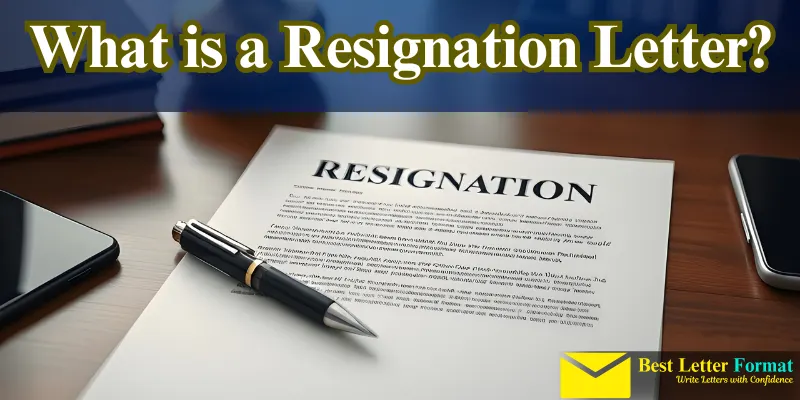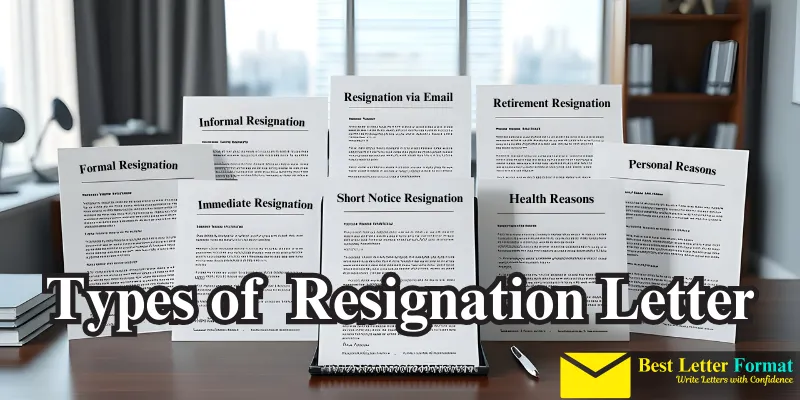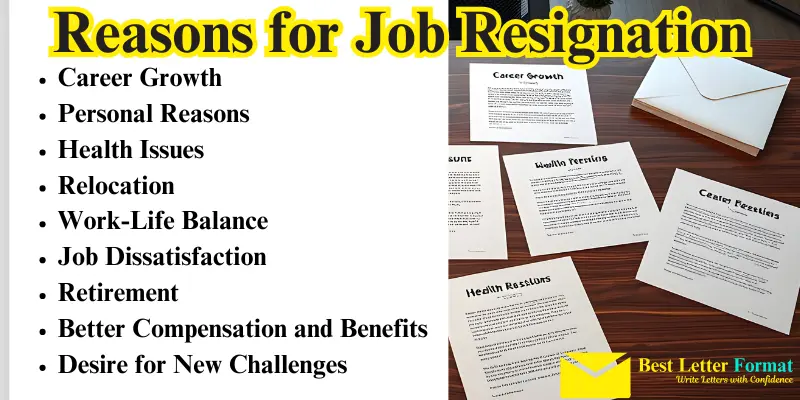What is a Resignation Letter? A Simple Guide to Writing One
Published: 9 Dec 2024
After years of hard work, the time has come for you to move on. You’ve learned a lot, made great friends, and gained plenty of experience. But one day, you get an offer for your dream job, one that matches your career goals perfectly. You’re excited but also nervous about how to leave your current role. What do you do next? How do you tell your employer you’re ready to move on?

This is where a resignation letter comes into play. It’s a formal way to let your employer know that you are stepping down from your position. Whether you’re moving to a new job, facing personal issues, or simply deciding it’s time for a change, a resignation letter helps you leave on a positive and professional note.
A resignation letter isn’t just a simple goodbye; it’s a key piece of communication that protects both you and your employer. It keeps things clear, professional, and respectful, no matter the circumstances surrounding your departure.
In this article, we’ll explore everything you need to know about what is a resignation letter. We’ll discuss the different types of resignation letters, the key reasons why people resign, and the importance of writing a professional resignation letter. We’ll also highlight common mistakes to avoid when resigning. Whether you’re submitting a formal resignation, giving immediate notice, or leaving for personal reasons, this article will guide you through the process with clarity and professionalism.
Let’s explore the importance of resignation letters and how they can help you maintain professionalism and open doors for future opportunities.
1. What is a Resignation Letter?
A resignation letter is a formal written notice that you submit to your employer to announce your intention to leave your job. It serves as a professional way to end the employment relationship and ensures a smooth transition. The letter typically includes your resignation statement, your last working day, and sometimes a brief reason for leaving. It’s important because it provides documentation of your departure, shows respect for your employer, and helps maintain professionalism. Whether you’re moving on to a new job or leaving for personal reasons, submitting a resignation letter helps you exit on good terms and maintain a positive relationship for the future.
2. Types of Resignation Letters
There are various types of resignation letters, each serving a different purpose depending on the situation. Here, we will explore different types of resignation letters that can be used in various scenarios, whether you’re resigning from a full-time job, part-time role, or an urgent situation. Below are some of the most common types of resignation letters you might consider:
- Formal Resignation Letter
The most common and professional type of resignation letter. Used when leaving a full-time, permanent, or professional job. This letter follows formal language and includes your last working day, reasons for leaving (optional), and expresses gratitude to the employer.
Example:
Dear [Manager’s Name],
I am writing to formally resign from my position at [Company Name], effective [Date]. I am grateful for the opportunity and experience I’ve gained here. Thank you for your support during my time with the company.
- Informal Resignation Letter
Typically used for part-time, temporary, or less formal roles. The tone is more casual and may not follow strict formalities. It’s suitable for positions that do not require a high level of professionalism.
Example:
Hi [Manager’s Name],
I wanted to let you know that I’ll be leaving my position at [Company Name] as of [Date]. I really enjoyed working here, and I’m thankful for the chance to be part of the team.
- Immediate Resignation Letter
This letter is used when an employee needs to leave the company without providing the usual notice period (often due to personal reasons, health issues, or an emergency). It’s essential to express your apologies and ensure you leave on good terms.
Example:
Dear [Manager’s Name],
Due to unforeseen personal circumstances, I must resign from my position effective immediately. I apologize for the short notice and hope this will not cause too much inconvenience. Thank you for understanding.
- Resignation via Email
A quick and convenient way to resign. This is often used in modern workplaces where formal documentation may be exchanged digitally. It’s important to maintain a professional tone, even in an email, to ensure clarity and respect.
Example:
Subject: Resignation Notice
Dear [Manager’s Name],
I am writing to formally resign from my position at [Company Name], with my last working day being [Date]. I appreciate all the opportunities I’ve had here and wish the team continued success.
- Short Notice Resignation Letter
Similar to an immediate resignation, but with a slightly longer notice period than zero. Typically given when you can’t give the full notice but still want to provide as much time as possible for the company to adjust.
Example:
Dear [Manager’s Name],
Due to unforeseen circumstances, I am unable to provide the usual notice period and will be resigning with only [X days/weeks] notice. I sincerely apologize for any inconvenience this may cause.
- Retirement Resignation Letter
Used when someone is resigning due to retirement. It’s a polite and gracious way to announce the end of your working career, acknowledging your years of service and thanking your employer for the opportunities provided.
Example:
Dear [Manager’s Name],
I am writing to formally announce my retirement from [Company Name], effective [Date]. I have enjoyed my years here, and I am grateful for the opportunities and support I’ve received. Thank you for everything.
- Resignation Letter Due to Health Reasons
A resignation letter specifically mentioning health problems that require the employee to leave their job. It is essential to maintain a respectful tone and focus on health as the primary reason for leaving.
Example:
Dear [Manager’s Name],
Due to ongoing health issues, I must resign from my position at [Company Name], effective [Date]. This was not an easy decision, but I believe it is the best step for my well-being. Thank you for your understanding.
- Resignation Letter for Personal Reasons
Used when an employee decides to leave for personal matters that don’t require explanation. This letter is more general and can be used for various situations, including family matters, relocation, or a change in life circumstances.
Example:
Dear [Manager’s Name],
I am resigning from my position at [Company Name] effective [Date] due to personal reasons. I appreciate the opportunity to work with such a great team and will always be grateful for the experience.
- Resignation Letter with Notice Period
A standard letter where an employee provides the company with the required notice period (usually two weeks). It’s important to state the end date clearly and express gratitude.
Example:
Dear [Manager’s Name],
I am writing to formally resign from my position at [Company Name], with my last working day being [Date], as per the required notice period in my contract. I want to thank you and the team for the incredible opportunities and experiences I’ve had here. Please let me know how I can assist in the transition during my final weeks.
- Resignation Letter for Career Growth
This type of letter is written when the employee is leaving to pursue career advancement or better job opportunities. The letter should reflect excitement for the new role while appreciating the experiences gained in the current position.
Example:
Dear [Manager’s Name],
I am writing to formally resign from my position at [Company Name] as I have accepted an exciting new opportunity. My last working day will be [Date]. I am grateful for all the experience and knowledge I gained here.
- Resignation Letter for Relocation
If you’re leaving because of a move to a different city or country, this letter should clearly state the reason for resignation and express gratitude for the time spent at the company.
Example:
Dear [Manager’s Name],
Due to my relocation to [new location], I regret to inform you that I must resign from my position, effective [Date]. I have greatly enjoyed my time here and appreciate everything the company has done for me.
- Seasonal Job Resignation Letter
Used when someone is leaving a job that is temporary or seasonal in nature. This is common in retail or hospitality industries where the role is intended to last for a specific period.
Example:
Dear [Manager’s Name],
As the season comes to a close, I am resigning from my position as [Position Name]. Thank you for the opportunity to be part of the team during this busy time.
- Mutual Resignation Letter
When both the employer and employee agree that the employee should leave, this resignation letter acknowledges the mutual understanding and shows professionalism in exiting the company.
Example:
Dear [Manager’s Name],
After discussions with you, I have decided to resign from my position at [Company Name]. I appreciate the mutual understanding and look forward to future possibilities. My last working day will be [Date].
- Voluntary Resignation Letter
A letter used when an employee resigns by choice, as opposed to being terminated or laid off. It’s important to keep this letter formal, even if you’re voluntarily choosing to leave for reasons like a better opportunity.
Example:
Dear [Manager’s Name],
I am voluntarily resigning from my position at [Company Name], effective [Date]. I have enjoyed my time with the company and am grateful for all the experiences and skills I have developed here.
- Resignation Letter After Maternity Leave
This type of resignation letter is written when an employee decides not to return to work after maternity leave. It should maintain professionalism and show gratitude for the company’s support during the leave.
Example:
Dear [Manager’s Name],
After careful consideration, I have decided not to return to work following my maternity leave. I appreciate all the support during my leave and wish the team all the best.

3. Top Reasons People Resign from Their Jobs
When deciding to resign from a job, there can be many reasons behind the decision. These reasons often depend on personal situations, professional growth, or health challenges. Understanding these reasons can help you better explain your resignation in a way that’s both professional and respectful. Let’s explore some key reasons why people resign from their jobs.
- Career Growth
Many people resign from their jobs to seek new career opportunities. This might involve a better job, more responsibilities, or a higher salary. A new position might offer more room for growth, better chances to learn new skills, or a more prestigious company to work for.
Example: “I’ve decided to leave my current position as I’ve been offered a role that aligns more closely with my long-term career goals.”
- Personal Reasons
Sometimes, personal issues such as family responsibilities, life changes, or the need to focus on one’s personal life may require someone to step away from work. These situations might include taking care of a loved one, focusing on family, or simply wanting to spend more time with family.
Example: “I have decided to resign due to personal reasons, as I need to devote more time to my family at this stage in my life.”
- Health Issues
Health problems, both physical and mental, are common reasons for resigning. If an employee is unable to perform their duties due to health concerns, they might choose to resign to prioritize their well-being. Mental health is becoming a recognized reason for leaving a job, especially when the workplace environment is stressful or overwhelming.
Example: “Due to ongoing health issues, I have to step down from my role to focus on recovery and well-being.”
- Relocation
People may also resign from their jobs when they move to a different city or country. Relocating for a partner’s job, family reasons, or even just seeking new living opportunities can require someone to leave their current position.
Example: “I am resigning because I’m relocating to another city, and unfortunately, I cannot continue in my current role.” - Work-Life Balance
For many, the work-life balance is a crucial aspect of their happiness. If a job is taking too much time or causing burnout, an individual may resign to focus on their well-being and other areas of life.
Example: “I have realized that my current role doesn’t provide the balance I need between my work and personal life, so I have decided to step away.” - Job Dissatisfaction
Sometimes, employees leave because they are unhappy in their roles. This could be due to a lack of job satisfaction, poor work environment, or feeling undervalued.
Example: “After much thought, I’ve realized that my current role no longer aligns with my goals and passions, which is why I’ve decided to resign.” - Retirement
When an individual reaches a certain age, they may choose to retire. Retirement is the end of a long career, and people often leave their jobs to enjoy more leisure time or pursue hobbies.
Example: “I am resigning to retire and enjoy the next chapter of my life.” - Better Compensation and Benefits
A common reason for resignation is the offer of better compensation or benefits. This could include a higher salary, better healthcare, more vacation days, or improved work conditions.
Example: “I’ve decided to resign as I have received an offer with better compensation and benefits that will better support my needs.” - Desire for New Challenges
Some employees may feel bored or stuck in their current roles and want a job that presents new challenges. They might leave to pursue a role that pushes their limits and allows them to learn new skills.
Example: “I’m resigning to seek a new challenge in my career, as I feel that I’ve reached the peak of my growth potential in my current role.” - Conflict with Management or Coworkers
Sometimes, conflicts or disagreements with management or coworkers can make the work environment unbearable. If communication breaks down or work relationships become strained, someone might resign to avoid ongoing frustration.
Example: “After careful consideration, I have decided to resign due to ongoing disagreements and a challenging work environment.”

4. Why a Professional Resignation Letter is Crucial
Leaving a job is a big decision, and doing it the right way matters. When you submit a resignation letter, it’s not just about telling your boss you’re leaving it’s about doing it in a way that reflects professionalism and respect for both you and the company. Here’s why submitting a resignation letter is so important:
1. Keeps Relationships Positive
Think about it: You might leave a job, but the relationships you’ve built don’t have to end. A resignation letter helps you leave on good terms, ensuring you maintain professional connections. You never know when you might need a reference or might cross paths with the same people in the future, so it’s crucial to show appreciation and professionalism, even when you’re moving on.
2. Helps With Company Documentation
When you resign, the company needs a formal record. This is where your resignation letter comes in. It helps the HR department keep everything in order and ensures the paperwork is complete. Having this written record can also help in case of any future legal or official requirements.
3. Ensures a Smooth Transition
A resignation letter provides your employer with notice of your departure, giving them time to plan for the transition. Whether it’s finding your replacement or adjusting team roles, your notice makes things easier for everyone involved. It’s a small gesture that can go a long way in making sure everything runs smoothly after you leave.
4. Protects You Legally
In many industries, you’re required to give notice before resigning. A resignation letter ensures you meet this requirement, protecting you legally. It shows you’re following the rules of your contract, which can be important if you ever need to return to the company or if any disputes arise.
5. Closes the Chapter Professionally
A resignation letter isn’t just about leaving—it’s about leaving on a positive note. It allows both you and your employer to have closure. It’s your chance to express gratitude, reflect on the time spent with the company, and ensure that the door stays open for future opportunities.
5. Essential Components of a Winning Resignation Letter
Writing a resignation letter can feel like a daunting task, but with the right components, it can be a smooth and professional process. Here’s a breakdown of the key elements to include in your resignation letter to ensure it leaves a lasting positive impression:
1. Polite Greeting
Start your resignation letter with a respectful greeting. Address your boss or HR professional appropriately.
- Example: “Dear [Manager’s Name],” or “Dear [HR Manager’s Name],”
- Why it’s important: A respectful tone sets the stage for a professional resignation.
2. Clear Notice Period
Let the employer know how much notice you’re providing before leaving.
- Example: “I am providing [X weeks] notice as required by my contract.”
- Why it’s important: This allows the company to prepare for your departure and begin the hiring process if needed.
3. Expressing Gratitude
Even if you’re leaving for personal reasons, it’s good to express thanks for the opportunity to work with the company.
- Example: “I want to thank you for the opportunity to be part of [Company Name]. It has been a rewarding experience.”
- Why it’s important: Gratitude helps maintain a positive relationship and shows professionalism.
4. Positive Closing Remarks
End your letter on a positive note, offering to help with the transition.
- Example: “Please let me know how I can assist during the transition period.”
- Why it’s important: It leaves the door open for future professional opportunities and shows that you care about the smooth transition of your responsibilities.
6. Legal Aspects of a Resignation Letter
When you resign from a job, there are some legal rules you should be aware of. These rules can change based on the country you live in or the job industry. Let’s break down some important legal things to consider when writing a resignation letter:
1. Notice Period Requirement
Before leaving a job, most employers expect you to give them a notice. The notice period is a set amount of time you need to inform your employer before your last working day. In most cases, it’s around two weeks, but some companies might require a month or more.
- Why is it important? The notice period gives the employer enough time to find a replacement or make plans to adjust.
- What happens if you don’t follow it? If you leave without giving the required notice, the company may not be happy, and it could hurt your professional reputation.
2. Contractual Obligations
When you join a company, you usually sign an employment contract. This contract may state the specific terms and conditions about leaving the company, such as the required notice period.
- Why should you care? If you don’t follow the terms in your contract, it might lead to legal issues or even a financial penalty.
- Always check your contract: Make sure you understand the rules regarding resignation before you submit your letter.
3. Severance Pay and Benefits
In some cases, you might be entitled to severance pay or benefits when you resign. These are payments or perks that the company gives when you leave.
- When is it applicable? It’s usually mentioned in the contract or as part of company policy.
- How to claim it? You can ask the HR department for clarification on any severance or benefits you may receive when you resign.
4. Non-Compete Agreements
Some companies may ask you to sign a non-compete agreement when you join. This means you agree not to work for a competing company for a certain period after leaving.
- Why is it important? If you’ve signed this agreement, you must follow it to avoid legal trouble.
- Check before you leave: Make sure you understand the terms of any non-compete clauses in your contract.
Key Takeaways from Legal Aspects of Resignation
- 1. Check your contract: Always review the employment contract for terms about resignation.
- 2. Follow the notice period: Make sure you give the correct notice period.
- 3. Understand severance pay: Know if you are entitled to any benefits or severance.
- 4. Non-compete agreements: Be aware of any agreements that could affect your next job.
7. Tips for Writing a Resignation Letter
Writing a resignation letter can be tricky. You want to leave on good terms and show professionalism. Here are some helpful do’s and don’ts for writing a resignation letter.
Do’s for Writing a Resignation Letter
- Keep the tone polite and respectful
Always be polite in your letter. Even if you are leaving because of bad experiences, remain respectful. A positive tone shows professionalism and helps leave a good impression. - Offer to help with the transition
Offer to help train your replacement or assist with the transition process. This shows that you care about your current job and the company’s success even after you leave. - Express gratitude
Thank your employer for the opportunity. It’s important to show appreciation for the experiences you gained while working there. A simple “Thank you for the opportunity” can make a big difference.
Don’ts for Writing a Resignation Letter
- Avoid negative remarks
Don’t include negative comments about the company, your boss, or colleagues. Keep the letter professional and free from complaints. You want to leave on a positive note, not cause drama. - Don’t provide too many details
There’s no need to explain every little reason for your resignation. Keep the letter short and to the point. A long explanation may come off as unprofessional or overly personal. - Avoid making the resignation letter too emotional
While it’s normal to feel emotional when leaving, try to avoid being overly sentimental in your letter. Keep it professional and respectful.
8. Advantages of a Resignation Letter
A resignation letter has several benefits for both the employee and the employer. It helps in maintaining professionalism and ensures that the transition is smooth.
- Professionalism
- Shows that you are leaving the job in a professional way.
- Helps you exit on good terms with your employer.
- Clear Communication
- Clearly states your last day of work.
- Helps both you and the employer understand the terms of resignation.
- Maintaining Future Opportunities
- Keeps the door open for job references.
- Allows for the possibility of being rehired in the future.
- Documentation for the Company
- Useful for HR records.
- Provides legal documentation for the company.
9. Disadvantages of a Resignation Letter
While there are many benefits, a resignation letter also has a few downsides that you should consider before submitting it.
- Missed Opportunities for Immediate Departure
- The formality of a resignation letter may delay an immediate exit.
- Some employers need time to process the resignation.
- Exposing Personal Reasons
- Sharing personal reasons can make you feel uncomfortable.
- Sometimes it’s better to keep personal reasons private.
- Potential for Negative Reactions
- Employers may not always react positively.
- Despite professionalism, some employers may not appreciate the resignation.
- Legal Complications
- The terms of resignation can sometimes cause confusion.
- It may lead to legal issues if not clearly understood by both parties.
Conclusion:
In this article, we’ve covered everything you need to know about what is a resignation letter and how to write one professionally. A resignation letter is a formal notice to your employer, notifying them of your decision to leave your job.
- Key points to remember:
- Clearly mention your last working day.
- Keep the tone respectful and professional.
- Express gratitude for the opportunity.
- Types of resignation letters:
- Formal Resignation Letter
- Immediate Resignation Letter
- Email Resignation Letter
- Common reasons for resignation:
- Career growth
- Personal or health reasons
- Relocation or work-life balance
If you’re ready to resign and need help writing your resignation letter, leave a comment below! We’re here to guide you.

- Be Respectful
- Stay Relevant
- Stay Positive
- True Feedback
- Encourage Discussion
- Avoid Spamming
- No Fake News
- Don't Copy-Paste
- No Personal Attacks

- Be Respectful
- Stay Relevant
- Stay Positive
- True Feedback
- Encourage Discussion
- Avoid Spamming
- No Fake News
- Don't Copy-Paste
- No Personal Attacks








